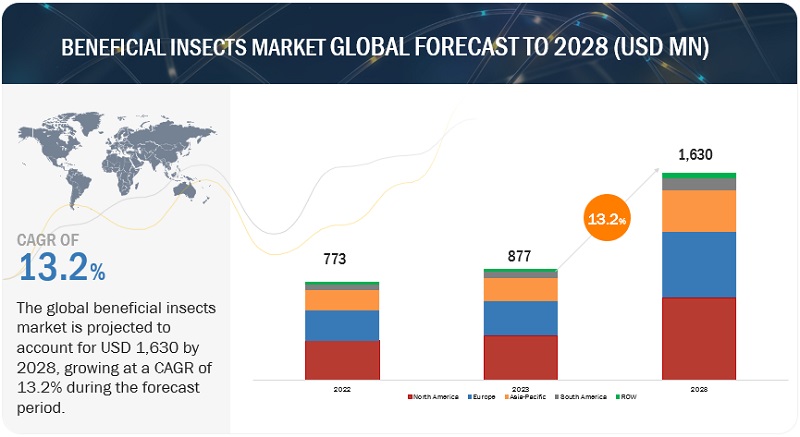The beneficial insects market size is projected to reach USD 1,630 million by 2028 from USD 877 million in 2023, at a CAGR of 13.2% during the forecast period in terms of value. In a recent advancement in 2021, a team of researchers at the University of Florida published a study that found that beneficial insects can help to reduce the incidence of crop diseases. The study found that beneficial insects can help to control pests that spread crop diseases and that they can also help to improve the health of plants by pollinating them and providing them with other beneficial services. The study’s findings suggest that beneficial insects can play a role in reducing the use of pesticides to control crop diseases.

The demand for organic farming is increasing, and this is leading to an increase in the demand for beneficial insects. Organic farming is a type of agriculture that does not use synthetic pesticides or fertilizers. This means that organic farmers rely on natural methods to control pests and diseases, and beneficial insects are a key part of this strategy.
Beneficial Insects Market Trends
1. Growing Demand for Organic and Sustainable Agriculture: With increasing awareness about the adverse effects of chemical pesticides on human health and the environment, there has been a significant shift towards organic and sustainable farming practices. Beneficial insects offer a natural and eco-friendly alternative for pest control, aligning with this trend.
2. Regulatory Pressures and Bans on Harmful Pesticides: Many countries have been implementing stricter regulations on the use of chemical pesticides, leading farmers to seek safer alternatives. This has created a favorable environment for the adoption of beneficial insects as biological pest control agents.
3. Advancements in Rearing and Application Technologies: Ongoing advancements in rearing techniques, packaging, and application methods have made it easier and more cost-effective for farmers to integrate beneficial insects into their pest management strategies. Improved understanding of the lifecycle and behavior of these insects also enhances their efficacy.
4. Rise of Integrated Pest Management (IPM) Programs: Integrated Pest Management (IPM) approaches, which combine multiple pest control methods including biological, cultural, and mechanical strategies, have gained traction in agriculture. Beneficial insects play a crucial role in IPM programs by providing natural pest control and reducing reliance on chemical pesticides.
5. Expanding Applications Beyond Agriculture: The use of beneficial insects is not limited to agriculture. They are also employed in other sectors such as forestry, horticulture, and urban landscaping for pest control and pollination services. This diversification of applications contributes to the overall growth of the beneficial insects market.
6. Increasing Investment and Research: There has been a surge in investment and research activities focused on the development of new strains of beneficial insects, optimization of rearing techniques, and enhancement of their efficacy. This investment fosters innovation and drives market expansion.
7. Consumer Preference for Sustainable Products: Consumers are increasingly inclined towards products that are produced using sustainable and environmentally friendly practices. Agriculture that utilizes beneficial insects aligns with these preferences, driving demand for such products in the market.
Beneficial Insects Market Opportunities : Ease of Management in Controlled Environments for Beneficial Insects
Beneficial insects offer an opportunity for easy management in controlled environments. Unlike chemical pesticides, these insects can be conveniently deployed and monitored in controlled settings such as greenhouses or indoor farms. With regulated temperature, humidity, and lighting, the controlled environment creates optimal conditions for beneficial insect populations to thrive. This enhances their reproduction, survival, and pest control capabilities. Additionally, managing beneficial insects in controlled environments allows for precision agriculture, as farmers can closely monitor their performance and target specific pests. The ease of management in controlled environments presents an opportunity to maximize the effectiveness of beneficial insects, promoting sustainable agriculture and consistent crop protection outcomes.
Growing demand for pest-specific bio-control agents drive the adoption of beneficial insects.
The increasing demand for pest-specific bio-control agents is a significant driver behind the adoption of beneficial insects in agriculture. Farmers recognize the importance of using host-specific natural enemies as a targeted approach to pest control. The ability of beneficial insects to selectively target and eradicate specific pests while sparing other beneficial insects in the field is highly valued. The concept of a host range, where beneficial insects prey on specific pest species, ensures accurate and efficient pest management. This emphasis on pest specificity aligns with the growing demand for sustainable and environmentally friendly agricultural practices. As a result, the rising demand for pest-specific bio-control agents fuel the adoption of beneficial insects as an effective solution to address specific pest challenges, promoting integrated pest management strategies and reducing reliance on chemical pesticides.
North America is expected to dominate its market share in the market during the forecast period.
The beneficial insects market in the world is dominated by North America. Beneficial insects are one of the crop protection market’s fastest-growing segments in North America. Due to growing consumer concern over their health and the environment, there is an increase in the market for organic crop protection solutions in North America. The consumption of organic products has also been heavily promoted because they don’t include synthetic chemicals that leave behind residues and support the expansion of the beneficial insects market in North America.
Beneficial Insects Market Share
The key players in this market include Applied Bionomics Ltd (Canada), Biobest Group NV (Belgium), Bioline AgroSciences Ltd (UK), Fargro Limited (UK), Andermatt Group AG (Switzerland), ARBICO Organics (US), BioBee Ltd (Israel), BIONEMA (UK), Koppert (Netherlands), Tip Top Bio-Control (US), Evergreen Growers Supply, LLC (US), Anatis Bioprotection (Canada), GrowLiv Biologicals (Canada), Planet Natural (US), Natural Pest Controls (US). These players have adopted various growth strategies such as partnerships, agreements, and collaborations to increase their global market presence.
Recent Developments:
In August-2023, Biobest Group NV (Belgium) acquired Agronologica Unip. Lda. (Portugal), which will allow enhanced access to Biobest’s technical expertise, product portfolio, and optimized logistics, in Portugal for Agronologica.
In May-2023, The Bionema (UK) introduced a new Digital Biocontrol Training platform to assist end-users in realizing the full potential of their highly successful biological-based crop protection and enhancement products the digital training platform opens with the application of biological insecticides.
Key Questions Addressed by the Beneficial Insects Market Report:
How big is the beneficial insect market?
What factors influence the growth of the beneficial insects market?
Which region is expected to hold the highest market share?
What is the total CAGR expected to be recorded for the beneficial insects market during 2023-2028?
What are the key challenges faced in the beneficial insects market?
Get 10% Free Customization on this Report: https://www.marketsandmarkets.com/requestCustomizationNew.asp?id=186836772
About MarketsandMarkets™
MarketsandMarketsTM has been recognized as one of America’s best management consulting firms by Forbes, as per their recent report.
MarketsandMarkets™ is a blue ocean alternative in growth consulting and program management, leveraging a man-machine offering to drive supernormal growth for progressive organizations in the B2B space. We have the widest lens on emerging technologies, making us proficient in co-creating supernormal growth for clients.
Earlier this year, we made a formal transformation into one of America’s best management consulting firms as per a survey conducted by Forbes.
The B2B economy is witnessing the emergence of $25 trillion of new revenue streams that are substituting existing revenue streams in this decade alone. We work with clients on growth programs, helping them monetize this $25 trillion opportunity through our service lines – TAM Expansion, Go-to-Market (GTM) Strategy to Execution, Market Share Gain, Account Enablement, and Thought Leadership Marketing.
Built on the ‘GIVE Growth’ principle, we work with several Forbes Global 2000 B2B companies – helping them stay relevant in a disruptive ecosystem. Our insights and strategies are molded by our industry experts, cutting-edge AI-powered Market Intelligence Cloud, and years of research. The KnowledgeStore™ (our Market Intelligence Cloud) integrates our research, facilitates an analysis of interconnections through a set of applications, helping clients look at the entire ecosystem and understand the revenue shifts happening in their industry.
Media Contact
Company Name: MarketsandMarkets™ Research Private Ltd.
Contact Person: Mr. Aashish Mehra
Email: Send Email
Phone: 18886006441
Address:630 Dundee Road Suite 430
City: Northbrook
State: IL 60062
Country: United States
Website: https://www.marketsandmarkets.com/Market-Reports/beneficial-insects-market-186836772.html

